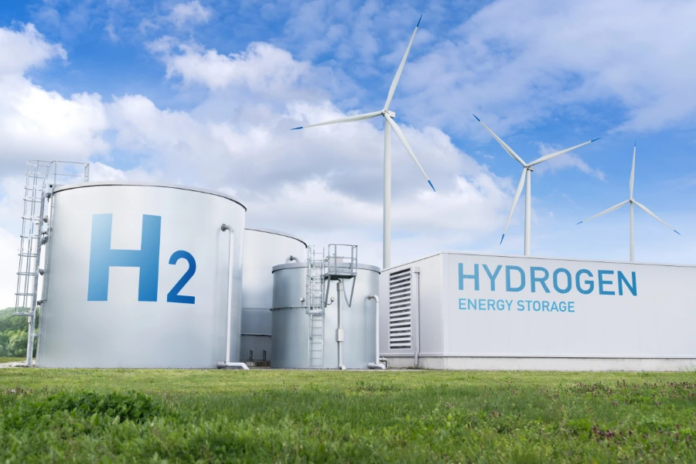A recent study by Dagnachew et al. (2025) titled “A green hydrogen revolution in Africa remains elusive under current geopolitical realities,” published in Climate Policy, reveals that green hydrogen could provide cost-effective energy for transportation and industry, supporting Africa’s transition to a more sustainable economy.
“
Africa has immense potential for green hydrogen production, but financial, technological, and geopolitical challenges must be addressed to ensure sustainable growth.– Dagnachew et al. 2025
The study examines the opportunities and challenges of establishing a green hydrogen economy in Africa. With abundant renewable energy resources and vast land, Africa has the potential to become a key player in green hydrogen production, driving sustainable development and industrial growth. However, geopolitical constraints and extractive economic practices could limit the continent’s ability to fully leverage this potential.
The study highlights both the opportunities and challenges of developing a green hydrogen economy in Africa. Green hydrogen has the potential to provide affordable and sustainable energy for industrial processes and transportation, positioning the continent as a key player in the global energy transition. Major projects in Namibia, Egypt, and Mauritania showcase Africa’s technical capabilities, while estimates from Africa’s Green Hydrogen Alliance suggest that large-scale hydrogen production could drive significant GDP growth and economic benefits.
However, several challenges hinder progress. Limited access to finance, technology, infrastructure, and policy stability poses significant barriers to scaling up hydrogen initiatives. Additionally, extractive geopolitical practices could restrict Africa’s ability to establish an independent and competitive hydrogen market. To fully realize its potential, Africa must secure equitable global partnerships, advocate for technology transfer, and attract sustainable investment to empower local economies and build resilient hydrogen infrastructure.
How the Study was Conducted
The authors analyzed existing reports, such as those from the Africa Green Hydrogen Alliance (AGHA) and the European Investment Bank, to assess Africa’s potential in green hydrogen production. The authors examined specific projects in countries like Namibia, Egypt, and Mauritania to highlight ongoing efforts and challenges. The study reviewed current regulations, financial incentives, and geopolitical factors affecting green hydrogen development, and contributions from multiple institutions and experts provided a multidisciplinary perspective on the topic.
What the Authors Found
The study found that Africa holds immense potential for developing a green hydrogen economy, leveraging its vast renewable energy resources and land to produce green hydrogen. This could enable sustainable energy access, industrial development, and economic growth.
Why is this important
Climate Action: Green hydrogen can significantly reduce greenhouse gas emissions by providing a clean energy source for industries and transportation. This aligns with global efforts to combat climate change and limit global warming.
Energy Sovereignty: Developing green hydrogen can help African nations reduce their dependence on imported fossil fuels, ensuring energy security and resilience.
Economic Growth: Leveraging Africa’s vast renewable energy resources and land, green hydrogen projects could stimulate industrial development, create jobs, and boost GDP in many African countries.
Global Role: By asserting itself as a key player in the global green hydrogen market, Africa could shape equitable partnerships and demand technology transfer, fostering sustainable development and innovation.
Sustainable Development Goals: Green hydrogen has the potential to accelerate progress on goals like affordable and clean energy, decent work, economic growth, and reduced inequalities.
What the Authors Recommended
The authors make several key recommendations to unlock Africa’s potential in green hydrogen and ensure that it leads to sustainable and equitable development:
- Governments should create robust regulations and financial support systems to promote the adoption of green hydrogen technologies.
- Building local demand for green hydrogen will help create sustainable jobs, stimulate industrial growth, and ensure economic benefits remain within the continent.
- African nations should work together and with global partners to develop and operate hydrogen infrastructure, leveraging shared resources and expertise.
- African countries must demand fair and equitable global collaborations that promote technology transfer, knowledge sharing, and investment to empower local economies.
- Efforts should focus on accessing the technologies required for green hydrogen production, ensuring that African nations are not left dependent on external players.
- The green hydrogen revolution should align with Africa’s broader sustainable development goals, such as Agenda 2063, which envisions a self-empowered and sustainable continent.
Africa has the potential to become a global leader in green hydrogen production, leveraging its abundant renewable energy resources to drive economic growth, industrialization, and sustainability. However, realizing this potential requires overcoming significant challenges, including financial constraints, policy instability, and geopolitical barriers. By fostering equitable partnerships, investing in infrastructure, and advocating for technology transfer, African nations can build a resilient and competitive hydrogen economy. With the right policies and strategic investments, green hydrogen can play a transformative role in Africa’s energy transition, ensuring a cleaner, more prosperous, and self-sufficient future for the continent.
















 The African Research (AR) Index is a comprehensive scholarly directory and database focused explicitly on journal publishers that publish and disseminate African research.
The African Research (AR) Index is a comprehensive scholarly directory and database focused explicitly on journal publishers that publish and disseminate African research.

